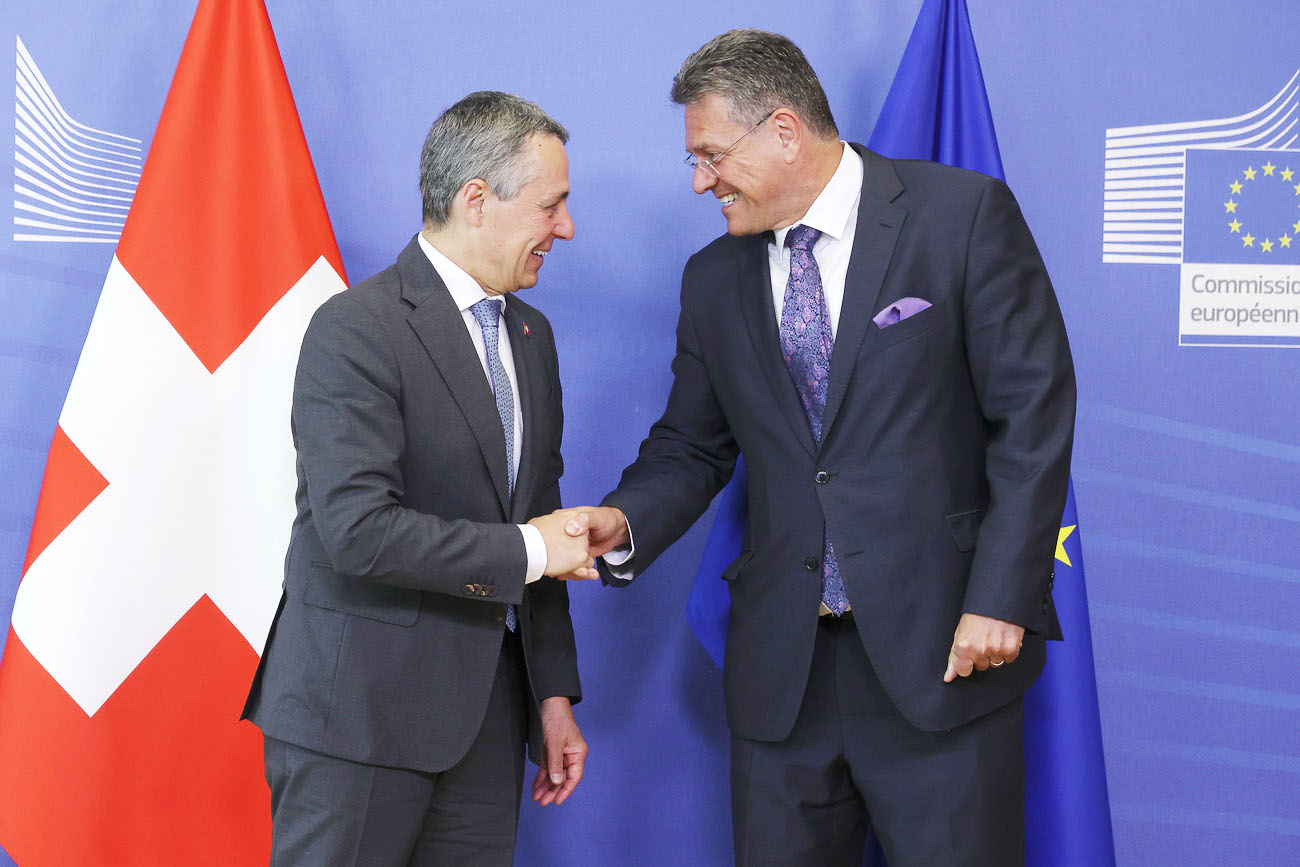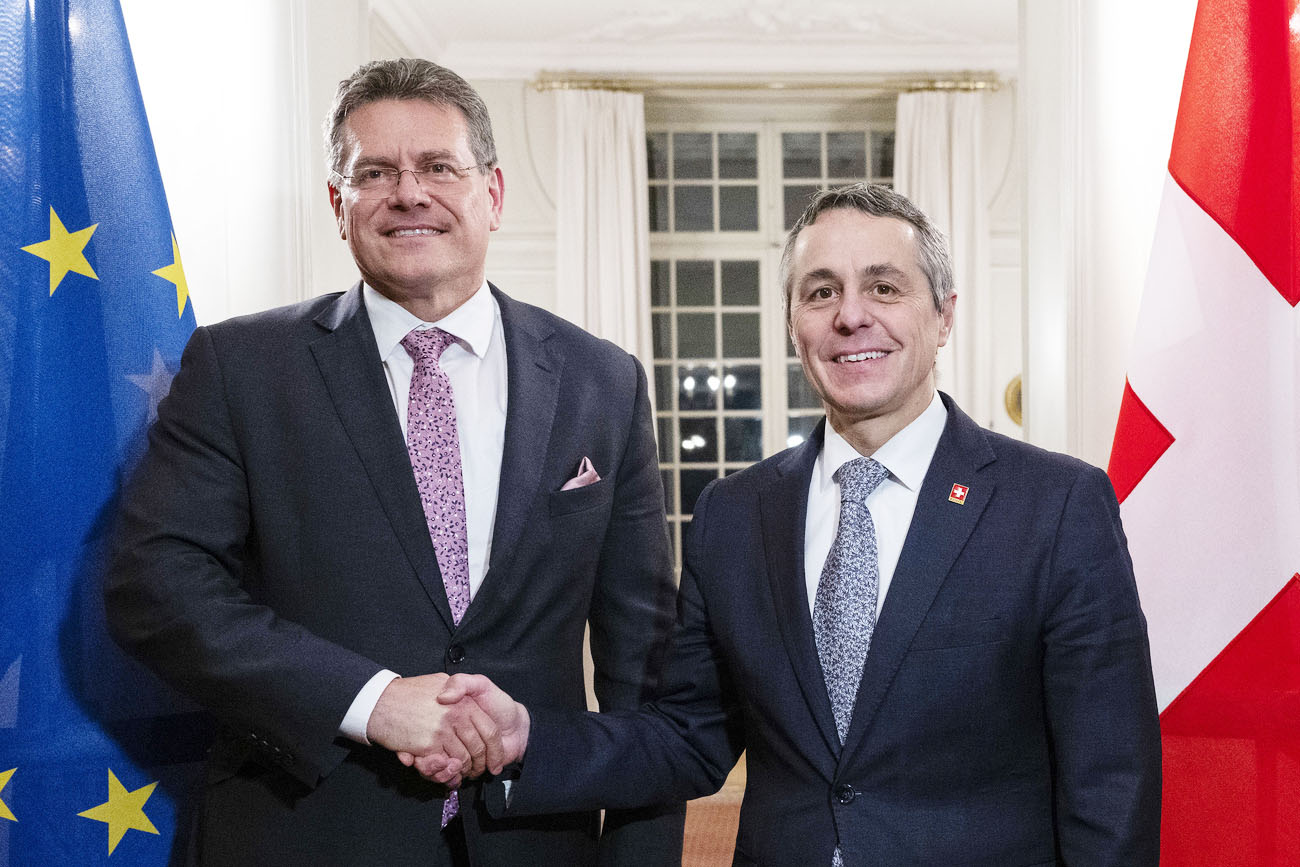
Swiss wage protection – a model for the EU?

Switzerland has to reset its relationship with Europe. A look at Swiss wage protection shows it is being used by trade unions, including some in the EU, as leverage. An analysis.
Talks between Bern and Brussels are on hold. In Bern, the EU file has been shelved. It won’t be re-opened before federal elections at the end of October.
But Foreign Minister Ignazio Cassis wants to persuade his colleagues in the Swiss government to negotiate with Brussels – finally – as early as November.
In Switzerland the fault line now runs between the political left and the right. Essentially, two EU demands are causing resistance at home. The right does not want the European Court of Justice to become the ultimate arbiter between Switzerland and the EU. They talk about foreign judges. Most of the other parties do not want such judges either.
And the left does not want EU citizens to work cheaply in Switzerland. It defends Swiss wage protection. This has been the case for more than 20 years, and it is what almost all the other parties want.
So wage protection is the tough, non-negotiable core of the Swiss position. The reason for that is a consensus in Switzerland for this system.
It is worth taking a new look at this obstacle that Brussels has always wanted to negotiate into oblivion. One aspect in particular has received little attention: Swiss trade unions are fighting a proxy battle.
Fighting for Europe’s trade unions
The Swiss Trade Union Federation, which is at the forefront of defending wage protection, is also fighting for EU trade unions. With its finely balanced wage protection measures and so-called accompanying measures, Switzerland is to them a shining example, even the trailblazer. They want the same thing. They want to apply the model developed in Switzerland across the EU – so it is strategically important to them that Switzerland does not cave in.
Luca Cirigliano, secretary of the Swiss Trade Union Federation, said at a panel talk: “Our European partners at the European Trade Union Confederation plead with us: ‘Don’t say yes under any circumstances. Say no. Because we want more accompanying measures in the EU. If you give way, then our project for future accompanying measures in the EU is at risk’.”
Matter of principle
Urban Hodel, a spokesperson for the Swiss Trade Union Federation, told SWI swissinfo.ch: “In case of doubt, the EU Commission is always on the side of the market. So we have to work with the trade unions across Europe to develop the internal market in a way that benefits workers.”
Roland Erne, a professor of European industrial relations at University College Dublin, confirms this. “It seems like a conflict between Switzerland and the EU, but it’s a labour conflict. And those are automatically transnational,” he said.
Let’s put all this in context. Seven years of negotiations for a framework agreement broke off in 2021; since then, ten exploratory rounds on the bilateral relationship and more than 30 talks between the European Union and Switzerland have all led nowhere. And those who led the way say this is not about Switzerland at all.
They say the battle line is not between two states, but between employers and labour.

It’s astonishing. But if you talk to people close to the trade unions, you quickly find out that this is not astonishing but par for the course. Because the left has always been transnationally oriented, “international solidarity” is part of its genetic make-up.
The European question as leverage
Rebekka Wyler is co-general secretary of the Swiss Social Democratic Party. Ten years ago, in her doctoral thesis, she concluded that “Swiss trade unions have recently increased their international engagement”. Since then, over the past decade, they have become even more internationally active. The Swiss left, the trade unions and the Social Democratic Party have never before been as connected globally, Wyler says.
Her 364-page doctoral thesis is titled “Swiss Trade Unions and Europe”. Much of it reads today like a strategic anticipation of the past ten years of Swiss European policy. Wyler noted, for example, that the “Europeanisation of Swiss politics offered trade unions a moment of leverage”, which they soon recognised and used efficiently in the early 2000s.
Historic achievement
In concrete terms, the discussions on bilateral agreements between Switzerland and the EU enabled Swiss trade unions in 1999 and 2004 to push through long-sought, comprehensive wage protection measures in a “real power play”, according to Wyler.
The right-wing spoke of blackmail at the time. Switzerland needed the approval of the left for the agreement with the EU – and, as Wyler writes, “the trade unions used a window of opportunity to push through demands that would otherwise scarcely have found a majority”.
This is how Swiss wage protection came into being 20 years ago: a major achievement for Swiss trade unions – and now they are defending it.

More
What are accompanying measures?
Its origin lies in the wage gap with countries surrounding Switzerland. Because it is so steep, experts refer to it as the “wage cliff”. The average net monthly wage in Switzerland is currently around CHF6,000 ($6,800). In Germany it is CHF3,300, in Austria CHF2,700, in France CHF2,600 and in Italy CHF1,700. But all these countries are part of the same European single market.
This has consequences. An Italian plasterer’s company could work for a third of the price in Switzerland and – by Italian standards – still earn a decent wage. But that would put pressure on the Swiss plastering companies to adjust their wages downwards as well. This is called wage dumping.
Wage dumping is criticised and it is unfair, because the Swiss plastering company has to cover Swiss basic costs, while its Italian counterpart does not. Wage dumping means that both companies and workers lose out.

So from the outset, companies and workers’ representatives were united on this central point. These big political opponents – for very different reasons – surprisingly had a common, vital interest: fair prices and wages.
Opportunity for democracy
This resulted in a golden opportunity for Switzerland’s direct democracy, which often forces parliament to make far-reaching compromises as all sides can always threaten to initiate referendums. The result in this case was a finely polished diamond: Swiss wage protection, which has remained almost unchanged in practice.
A solution like Swiss wage protection could not have arisen in any other European country. In part because of another feature particular to Switzerland: the extraordinary influence of the trade unions in national politics. “Hardly any other country in the world has as many current and former trade union secretaries in parliament as Switzerland,” says Erne.
In the meantime, however, the EU has also evolved. It is no longer the “neoliberal EU labour market, where workers are regarded as commodities”, as trade unionist Luca Cirigliano said not long ago.
Revolution in the EU
Andreas Rieger, a Swiss trade unionist who also served for years on the executive board of the European Trade Union Confederation, even speaks of a “social curve”. He says the EU tightened its own guidelines for posting workers in 2019. Minimum wage guidelines followed in 2022. “That was a paradigm shift – historic,” he says.
The EU rules now also include contractual penalties, a Swiss achievement in this area.
One reason for this development in the EU is Brexit. The UK was also on a wage cliff but had no accompanying measures. This created the resentment and distortions that played a role in its departure from the EU. The EU experienced how a lack of wage protection can cause a net paying member to exit the union.

For Maros Sefcovic, who is responsible for Switzerland in Brussels, this development opened a window of opportunity in 2022. When he visited Switzerland in the spring of 2023, he offered the trade unions here a non-regression clause: a guarantee from Brussels that Switzerland would not have to reduce its high level of wage protection if the EU were to take similar measures at some point.
But this verbal promise was made virtually in passing. Switzerland’s tricky job at the moment is to pin Sefcovic’s words down in a draft treaty.
The EU, meanwhile, is feeling pressure from its own trade unions. They now want to see the finer details of the Swiss version, for example that they and the companies draw up the rules jointly and jointly monitor them. They want private collective labour agreements to be the general guideline, not state laws. They are also calling for companies to be obliged to pay deposits when they cross borders, which would act as a deterrent and facilitate prosecution.
They are demanding exactly what Switzerland already has.
If they manage to push their demands through, the EU will not have undermined Swiss wage protection. Quite the reverse.
Edited by Mark Livingston. Translated from German by Catherine Hickley

In compliance with the JTI standards
More: SWI swissinfo.ch certified by the Journalism Trust Initiative






























You can find an overview of ongoing debates with our journalists here . Please join us!
If you want to start a conversation about a topic raised in this article or want to report factual errors, email us at english@swissinfo.ch.